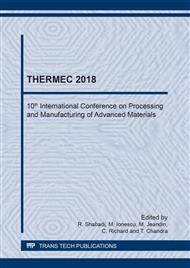p.413
p.420
p.426
p.432
p.438
p.443
p.453
p.458
p.468
Physical Simulation Methods Applied to Hot Rolling of Linepipe Steels
Abstract:
The simulation of industrial rolling processes has been shown to be an important method to optimize rolling parameters, reduce production costs and improve product quality. Previous works have shown the value of hot rolling simulation by means of torsion tests where the mean-flow-stress (MFS) can be successfully predicted. In the present work, three rolling schedules are simulated by hot torsion tests and compared. It is important to note this methodology provides the flexibility to test different ideas without the risk of downtime or damage to plant equipment that could result from an unsuccessful industrial trial. The simulation analysis considered the production steps from reheating through the final accelerated cooling as well as the final product microstructures. The study provides important information to the production of various steel grades such as pipeline, shipbuilding, structural and other high-end products.
Info:
Periodical:
Pages:
438-442
DOI:
Citation:
Online since:
December 2018
Price:
Сopyright:
© 2018 Trans Tech Publications Ltd. All Rights Reserved
Share:
Citation:


